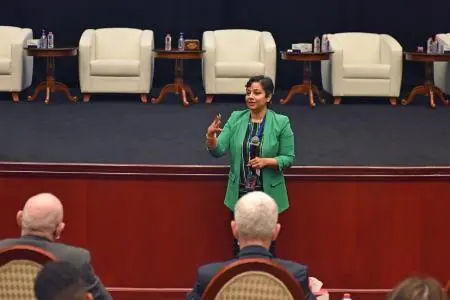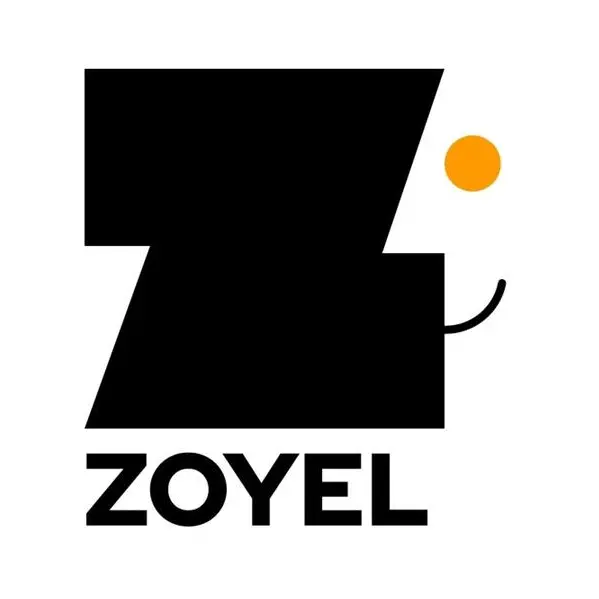PHOTO
- The event is part of ADU’s peer mentoring program, that seeks to aid in the personal and professional development of students
Abu Dhabi, United Arab Emirates : Abu Dhabi University (ADU), recently hosted the first face-to-face peer mentoring symposium in the MENA region at its main campus. Organized to provide personal and professional development to peer mentors, the symposium targeted faculty and students from the university. The event hosted universities from across the UAE, including, Higher Colleges of Technology (HCT – Sharjah & Abu Dhabi), Khalifa University (KU), Sorbonne University Abu Dhabi (PSUAD), The British University in Dubai (BUiD) and the University of Sharjah (UoS). The event highlighted key topics such as ways to be an effective and motivated peer mentoring, challenges in peer mentoring, importance of interpersonal skills and the positive influence on a mentee through mentoring.
The symposium focused on peer mentoring skills which include but are not limited to, excellent interpersonal skills, leadership, tolerance and accountability. Participants shed light on the importance of a positive attitude during peer mentoring. Mentors should prepare themselves to handle challenges faced with mentees with an open mind and a positive attitude in instances where a mentee does not deliver on time or does not meet set expectations.
The topics were geared towards developing mentorship skills, responsibilities and practices. Leadership and growth were a particular focus of the symposium, with the aim of further developing the future leadership skills of students. The mentees were educated on a plethora of ways in which mentors guided the students for a seamless transition into university life. The event culminated in a thought-provoking question and answer session, during which the attending universities also shared their effective peer mentoring practices.
Furthermore, the mentors presented tips and tactics on how to overcome obstacles during peer mentoring. The mentors identified that mentoring has a positive impact on mentees as it can lead the students to a better performance when executed correctly. In parallel, mentors with good mentoring skills will have a high competitive edge in the job market and it will increase their chances in obtaining opportunities at highly-accredited institutions.
Dr. Sreethi Nair, Dean of College of Arts and Sciences at Abu Dhabi University and founder of the Peer Mentoring Symposium, said: “The MENA region’s first peer mentoring symposium, hosted by Abu Dhabi University, was a valuable opportunity for mentors to share ideas and best practices with counterparts from universities across the region. In line with the UAE’s Golden Jubilee, it’s of the utmost importance that we prepare for the next 50 years by inspiring our youth and empowering them to lead us into a brighter future. The symposium reinforced the UAE’s values of tolerance, cooperation, cultural diversity and effective decision making.”
Nair added: “At Abu Dhabi University, we strive to create a collaborative university environment where students can support and learn from one other, every step of the way. As a result of our synergetic academic environment, ADU continues to graduate global citizens who in turn advance the values of multiculturalism and cross-collaboration wherever they go.”
Professor Thomas Glas-Hochstettler, Provost at ADU, commented: “Abu Dhabi University has always cultivated an academic environment where students are empowered to invest in their education while also nurturing their life skills. As a critical element of that environment, peer mentoring programs support and connect students who are passionate about mentoring and who would like to share mentorship skills and best practices with their fellow peers. Initiatives such as these align with ADU’s spirit of sharing and collaboration, and the peer mentoring symposium underscores squarely the importance of mentorship for all students.”
The peer mentoring symposium was met with high praise from all students in attendance. Elline Flores, a second-year aviation student at ADU, shared that the symposium imparted many valuable lessons and skills that are critical to mentorship and future mentors. The president of the student council at ADU, Alvina Ashraf, noted that her biggest obstacle as a peer mentor was the challenge of connecting and building relationships with mentees. Alvina has learned through the symposium that common interests between mentor and mentee are key to a more rewarding mentorship relationship.
The program aims to have an impact that extends beyond ADU’s reach and that activates future cooperation, in which universities collaborate to help their student communities through the exchange of knowledge, ideas, and best practices.
-Ends-
About Abu Dhabi University:
Established in 2003, Abu Dhabi University (ADU) is the largest private university in the United Arab Emirates. With campuses across Abu Dhabi, Dubai, Al Ain, and Al Dhafra, the University has a total enrolment of 7,800 students from over 80 nationalities. Structured into Colleges of Arts and Sciences, Business, Engineering, Law and Health Sciences, ADU offers undergraduate and graduate programs across a wide range of disciplines.
Abu Dhabi University is recognized as a world-class institution committed to excellence in teaching, research, and student experience, as evidenced by its prestigious regional and international accreditations. The University was the first private higher education institution in the GCC to earn international accreditation from the Californian Western Association of Schools and Colleges (WASC). ADU’s College of Business is accredited by the Association to Advance Collegiate Schools of Business (AACSB) and the prestigious EFMD Quality Improvement System (EQUIS). At a program level, the College of Engineering has received international accreditation from the world-renowned Accreditation Board for Engineering and Technology (ABET), and the Bachelor of Architecture has received Part 1 validation from the Royal Institute of British Architects (RIBA). The College of Health Sciences has earned accreditation from the Agency for Public Health Education Accreditation (APHEA).
According to the 2021 QS World University rankings, Abu Dhabi University ranked among the top 750 universities in the world and placed among the world’s top 150 universities under 50 years of age. ADU also earned a top 3 spot globally for international faculty and maintained its long-held position as part of the top 11 universities worldwide recognized for student body diversity.
Media Contacts
Weber Shandwick for Abu Dhabi University
Mohammad Al Azzam
malazzam@webershandwick.com
+971 2 449 4457
© Press Release 2021
Disclaimer: The contents of this press release was provided from an external third party provider. This website is not responsible for, and does not control, such external content. This content is provided on an “as is” and “as available” basis and has not been edited in any way. Neither this website nor our affiliates guarantee the accuracy of or endorse the views or opinions expressed in this press release.
The press release is provided for informational purposes only. The content does not provide tax, legal or investment advice or opinion regarding the suitability, value or profitability of any particular security, portfolio or investment strategy. Neither this website nor our affiliates shall be liable for any errors or inaccuracies in the content, or for any actions taken by you in reliance thereon. You expressly agree that your use of the information within this article is at your sole risk.
To the fullest extent permitted by applicable law, this website, its parent company, its subsidiaries, its affiliates and the respective shareholders, directors, officers, employees, agents, advertisers, content providers and licensors will not be liable (jointly or severally) to you for any direct, indirect, consequential, special, incidental, punitive or exemplary damages, including without limitation, lost profits, lost savings and lost revenues, whether in negligence, tort, contract or any other theory of liability, even if the parties have been advised of the possibility or could have foreseen any such damages.




















